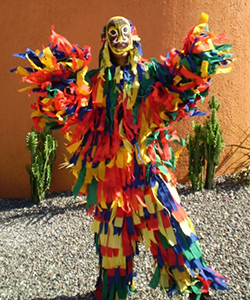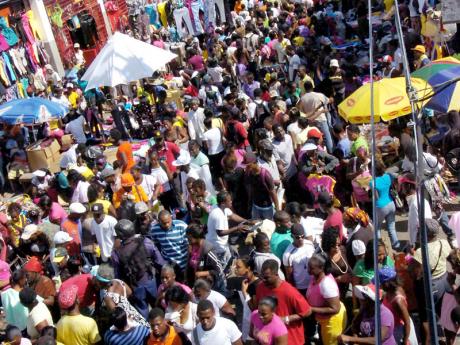
For enslaved persons in the Caribbean, Christmas was about the only respite they had in the calendar year. For that reason alone, Christmas has always been a big deal in Jamaica, going back centuries.
Christmas was the occasion of Jamaica’s most consequential protest movement, the Sam Sharpe Rebellion, otherwise known as the Baptist War.
Sam Sharpe, it is alleged, was convinced the queen of England had given freedom to the enslaved but it was being withheld by the Jamaican colonialists. He led a sit-down strike during Christmas 1831, which turned violent after the planter class responded with brutal force. By May 1832 more than 500 of the enslaved, including Sharpe, were executed, but the entire affair hastened the end of slavery, which was abolished by law in 1834 and overturned by 1838.
So, Christmas has been etched deep into the psyche of Jamaicans – the only period of real respite and break they had during slavery, and the beginning of the most important protest that led to freedom from slavery.
No wonder, therefore, that Jamaicans take Christmas very seriously. The celebration begins at least a week before December 25, and really ends only after January 1. Never, ever, seek to conduct any serious business between these dates. Other than financial institutions and retail stores, shops, markets and street side vendors, not much happens otherwise. It is time to let one’s hair down and let loose.
It is perhaps rightly termed “silly season,” for persons do crazy stuff. They drive faster and more recklessly, drink far more and much earlier in the day, and spend what they do not have. That is the time of year Jamaicans go into debt, and it is the time of year that you would want to get your “partner draw” to get spending money.
And this is actively encouraged. As a young man, just shortly out of high school, I worked in the bank for a short while. At Christmastime, I carried home far more liquor than I knew what to do with, all offered by bank clients. And I was a mere bank clerk! What was a teetotaler 19-year-old, newly baptized into the church and not knowing much about drinking, to do with seven bottles of expensive liquor (expensive for me at least), including Jonnie Walker Black and some well-aged, Appleton Reserve Blend?
My father told us this story, which I’m sure is apocryphal. He saw an acquaintance after the new year and asked him, “How was the Christmas?” The man said it was the best Christmas he had ever had. “I was drunk from Christmas Eve right through to New Year’s Day.”
Loving Christmas

But I must confess. Like the typical Jamaican, I absolutely love Christmas. The colors, the sounds, the vibes. Nothing beats Christmas in Jamaica. To really know it, feel it, experience it, one must attend Grand Market on Christmas Eve night. In most towns and cities, shoppers (revelers?) walk the streets in their hundreds and in their thousands, vendors spread their wares bazaar-style in the open on sidewalks and on pavements, and people come out in their funniest, or nicest, or sexiest casual outfits. It is at Grand Market you will meet persons you have not seen in years, in decades, and you catch up on old times. You walk a hundred paces and you meet up on another old friend, or classmate, or former coworker.
A Jamaica Gleaner report in 1866 reported on one such market scene in Kingston. “The market this year was numerously attended, by the beauty and fashion of the city. Long before dawn it was thronged with persons felicitating each other on the happy return of the season.”
Christmas is family time. When your relatives who have moved away and live overseas or in other Jamaican towns and cities visit, bringing gifts and goodies, and when the most sumptuous and expensive meal of the year is cooked and served at home.
People who live in rural areas raised goats and pigs and prized chickens to be slaughtered and cooked at Christmastime. A virtual feast. In many homes, it is the only occasion when certain china and silverware are used during the year.
It was the one time in the year when my mother and Mrs. Small would bake, whipping up more than half a dozen Christmas cakes, with us children helping to mix the batter. The prize? Being able to lick the spoons and the basins and the buckets in which the batter was mixed.
A revered tradition has lost popularity, but I gather is still practiced in some communities – caroling. Early in the morning, from as early as 5:00 or 5:30, church folk walk the community and sing carols, stopping before various residences and singing in loud and exuberant cadences, sometimes provocatively so, knowing that the occupants were not particularly welcoming of the predawn intrusion. A tradition that continues, especially in the older, mainline, more traditional churches, is Christmas morning worship service.
And of course, there were the Junkanoo bands of various colorful characters that would parade through the streets, playing musical instruments, dancing and prancing. According to Nadya-Kaye Phillips, “this band of comical, and sometimes scary, characters dates back to the days of slavery, when it was one of the few festivities that was allowed on plantations.”
While there is dispute as to the origin, some researchers credit Junkanoo to the Igbo people from out of West Africa, a view given credence by the practice of Junkanoo in Jamaica, Bahamas and parts of Virginia in the United States, where there were significant presence of Igbo people and their descendants.
Children were deathly scared of these Junkanoo characters. Pitchy Patchy, Police Man, Belly Woman, and especially Horse Head with his lance. Some Junkanoo bands included the Royal Court, caricatures of the British Royal family.
Michael Scott, writing in the early 1800s, said of the Junkanoo:
Their character hovers somewhere between that of a harlequin and a clown, as they dance about, and thread through the negro groups, quizzing the women and slapping the men; and at Christmas time, the grand negro carnival, they don’t confine their practical jokes to their own colour, but take all manner of comical liberties with the whites equally with their fellow bondsmen.
Jamaica’s Christmas has always been special. This is neither new nor novel. In the Falmouth Gazette in January 1882, a visitor to the island made the following observation of Jamaica at Christmastime:
I was most agreeably surprised to see, instead of a crowd of roughs, an immense gathering of people of all classes and hues, such as I had never in all my travels in many countries seen before. It was, in truth, a real Carnival, eclipsing, for splendour and order, and kindly displays of earnest good feelings, any similar gathering I had met in dear England, or in France, Italy, Germany, or America.